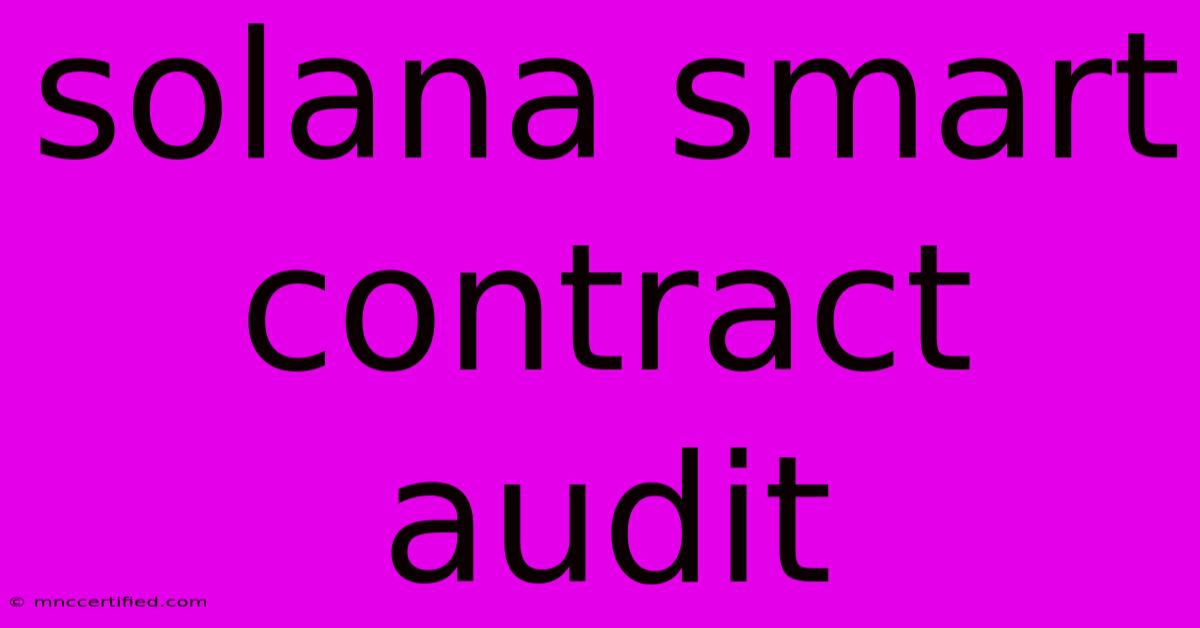Solana Smart Contract Audit

Table of Contents
Solana Smart Contract Audit: Ensuring Security and Reliability on the Solana Blockchain
The Solana blockchain, known for its speed and scalability, is attracting a growing number of developers building decentralized applications (dApps). However, the security of smart contracts deployed on Solana is paramount. A single vulnerability can lead to devastating consequences, including loss of funds, data breaches, and reputational damage. This is where a Solana smart contract audit becomes crucial. This comprehensive guide explores the importance of smart contract audits, the process involved, and how to choose the right auditing firm.
Why is a Solana Smart Contract Audit Necessary?
Smart contracts are self-executing contracts with the terms of the agreement between buyer and seller being directly written into lines of code. Because of their immutable nature, bugs or vulnerabilities in the code can have irreversible and costly repercussions. A thorough Solana smart contract audit aims to identify these vulnerabilities before they can be exploited by malicious actors. The benefits include:
- Preventing Exploits: Identifying and patching security flaws minimizes the risk of hacks and exploits, protecting user funds and data.
- Building Trust and Credibility: A reputable audit report demonstrates a commitment to security, boosting user confidence and attracting investors.
- Minimizing Financial Losses: Addressing vulnerabilities early prevents significant financial losses that could result from a successful attack.
- Improving Code Quality: The audit process often leads to improvements in code design, readability, and overall quality.
- Meeting Regulatory Requirements: In some jurisdictions, audits may become a regulatory requirement for certain types of dApps.
The Solana Smart Contract Audit Process
A typical Solana smart contract audit involves several key stages:
1. Requirements Gathering and Scope Definition
The audit begins with a clear understanding of the project's goals, functionality, and the scope of the audit. This involves detailed discussions with the development team to define what aspects of the smart contracts will be examined.
2. Static Analysis
This phase involves automated tools and manual code review to identify potential vulnerabilities without actually executing the code. This helps catch common errors such as arithmetic overflows, reentrancy vulnerabilities, and access control issues.
3. Dynamic Analysis
This phase involves testing the smart contract's functionality by simulating real-world scenarios and interactions. This helps identify vulnerabilities that might not be apparent through static analysis alone. Techniques like fuzzing and symbolic execution are frequently employed.
4. Formal Verification (Optional)
For highly critical applications, formal verification might be employed. This mathematically proves the correctness of the code, providing a higher level of assurance than other methods.
5. Reporting and Remediation
Once the audit is complete, a detailed report is generated that outlines identified vulnerabilities, their severity, and recommendations for remediation. The development team then works to fix these issues.
Choosing the Right Solana Smart Contract Audit Firm
Selecting a reputable auditing firm is crucial for the success of your project. Consider these factors:
- Experience and Expertise: Look for firms with a proven track record of auditing Solana smart contracts and a deep understanding of the Solana ecosystem.
- Methodology and Tools: Understand the firm's auditing methodology and the tools they utilize. A robust methodology ensures comprehensive coverage.
- Reputation and Reviews: Check online reviews and testimonials to gauge the firm's reputation and client satisfaction.
- Transparency and Communication: Ensure the firm is transparent about its processes and maintains clear communication throughout the audit process.
- Cost and Timeline: Obtain a clear understanding of the audit's cost and estimated timeline.
Beyond the Audit: Ongoing Security Practices
A Solana smart contract audit is not a one-time event. Ongoing security practices are vital for maintaining the security of your dApp. This includes:
- Regular Security Updates: Stay updated on the latest security vulnerabilities and patch any discovered issues promptly.
- Bug Bounty Programs: Consider implementing a bug bounty program to encourage security researchers to identify and report vulnerabilities.
- Continuous Monitoring: Monitor your smart contracts for unusual activity or suspicious transactions.
By understanding the importance of a Solana smart contract audit and following best practices, developers can significantly enhance the security and reliability of their dApps, fostering trust and growth within the Solana ecosystem. Remember, investing in security is an investment in the long-term success of your project.

Thank you for visiting our website wich cover about Solana Smart Contract Audit. We hope the information provided has been useful to you. Feel free to contact us if you have any questions or need further assistance. See you next time and dont miss to bookmark.
Featured Posts
-
Bg3 Render Of Mind And Body
Dec 02, 2024
-
Jack Daniels Bottle In Bond
Dec 02, 2024
-
Jude Law Rom Com A Classic Returns
Dec 02, 2024
-
Oregon Highway Use Tax Bond
Dec 02, 2024
-
Chelsea Vs Aston Villa Live Match Blog
Dec 02, 2024